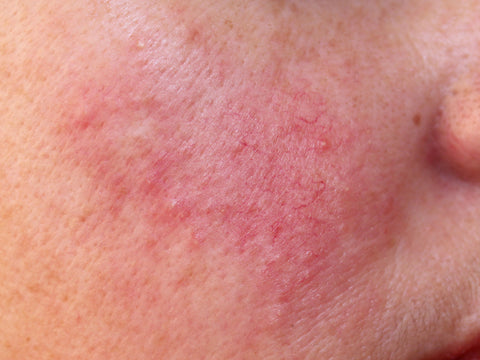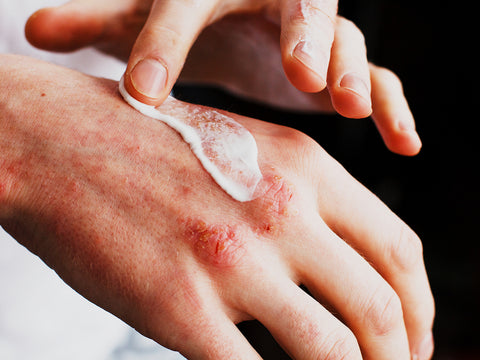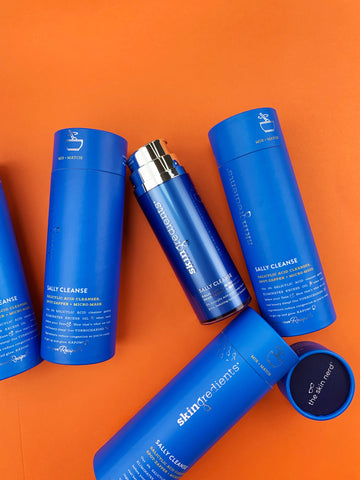
Why Your Skin Looks Worse in Winter
We’re spending a lot of time out and about at the moment, dashing from place to place, in and out of warmth, cold, and nativity plays (those were the days). But have you noticed how your skin always seems to look worse in winter?
There’s no two ways about it, however - our skin can look particularly tragic during the winter months, and it can be super frustrating, particularly if you’re thinking to yourself, ‘but I didn’t change anything!’
We might be able to deal with a bit of breakout occasionally from the stresses of life, or if we are trying out a new product that your skin needs to get used to- but having misbehaving skin all winter long? It’s too much to bear!
Why Your Skin Looks Worse In Winter
There are actually a lot of reasons for your skin to be suffering during the winter months. It’s not a particularly skin-friendly season, despite the fact that we might associate the summer with more skin-danger.
It’s true, UVB rays which are particularly prevalent during the summer have us on high alert and slapping on the SPF, but redness, breakouts, skin irritation, roughness and oiliness are only some of the issues which winter can bring on in our skin.
It’s not a time to get lax about skincare or protecting our skin, either - UVA rays exist all year around, and contribute to skin ageing, as well as putting us as risk of skin cancer. For this reason, it’s important to wear a broad spectrum SPF all year around, even in the winter!

Our skin can look worse in winter for many reasons - the season has us dealing with rapidly changing temperatures, hot to cold, as we move from indoors to outdoors. Harsh wind can affect our skin’s barrier, and not exfoliating enough can do a number on even normally well-behaved skin.
Diet, lack of sleep and environmental factors like wind and cold can also have a dramatic effect on your skin.
The reasons that your skin looks worse in winter can be explained - and if you learn the cause then the solution is just around the corner.
Why Is My Skin So Red?
Red, raw, inflamed skin is seen as part and parcel of winter - but it doesn’t have to be. Red skin is another sign of dehydration and an impaired skin barrier, as the cold temperatures strip away your skin’s natural moisture.
An impaired skin barrier means that your skin loses more moisture than it would normally, and this dehydration can make your skin appear red and inflamed, and feel itchy and uncomfortable.
If you’re prone to redness already, then the cold weather of winter might have you flaring up more than usual. If you suffer from rosacea, you’ll probably find your symptoms worsen in the winter months. The rapid changes from hot to cold as well as the dry indoor air as we blast central heating all conspire to chip away at your skin barrier and make you more red-faced than usual.

Spicy food can also trigger rosacea flare-ups, and we might be encountering this more than usual as we eat comfort food and try to keep the cold out - and alcohol is another unfortunate trigger. It can be hard to avoid during the party season (and also it’s everyone’s chance to get a bit bold) but this could be the reason that you’re suffering from a flare-up.
Upping your intake of vitamin C would we a good way to combat this, as vitamin C can bring down redness and inflammation and help to even out your skin tone. Skin Formulas Vit C Serum is an antioxidant serum, which promotes the production of collagen and helps to brighten your skin’s complexion. It can also help to diminish the appearance of hyperpigmentation.
Why Does My Eczema Flare Up In Winter?
First of all, we should define just what eczema is. It’s something which can be associated with infants and children as it's often first diagnosed in childhood, but it can also flare up for the first time in adulthood.
Eczema manifests as a red, itchy, scaly rash on the surface of the skin. The skin can become cracked, and can even blister. It is possible that someone who had eczema in childhood can grow out of the condition, but most people will have to manage it throughout their lives, as it cannot currently be cured.
Eczema can flare up in the wintertime and be extremely uncomfortable and itchy. In the winter, cold air and central heating can work together to dry out the skin, and the skin of hoomans suffering from eczema can struggle to maintain moisture, as their skin barrier is compromised. Warm clothes and scratchy fabrics (like wool) can all do their bit to have the eczema-prone hooman miserable in the winter.

You can manage the symptoms of eczema in the winter by lowering the temperature of your bath and shower (to avoid the shocking change in temperature that’s got you so uncomfy), investing in a humidifier to get a bit more moisture into the air, and also investing in a heavier moisturiser.
NeoStrata Bionic Face Serum is a great product to soothe skin suffering from eczema flare-ups in the winter months. It’s great for stressed skin, and adds radiance back to skin which is feeling a bit under pressure.
It contains 10% lac tobionic acid; an ideal ingredient for helping with skin texture as well as helping to improve the anti-ageing properties of other ingredients in your routine, as well as being intensely moisturising and providing antioxidant benefits. It also helps to reduce fine lines and wrinkles, and is super gentle.
This product is extremely soothing and can be applied to face and body as required! It’s a huge favourite in Nerd HQ, and has a very special place in the nerdie hearts.
Bia Skin Superfood by Codex Beauty is another great choice for itchy skin - it's super soothing to dry, irritated and flaky skin, and is made from a host of botanical superstars. It's Irish-made and super sustainable, too!
Why Does My Skin Look So Dull?
It’s the classic situation - the more you want your skin to be the perfect, glowy base for makeup or for a bit of bare-faced winter glory, the more it seems to shrivel in response. Dullness, greyness and a lack of radiance are common winter skin problems.
In the winter, the cold means that your body tends to hug your important internal organs and let anything peripheral kind of go without circulation - that’s the reason for icy fingers and toes! It’s the same reason that your skin can look so flat - blood tends to stagnate, leaving our skin out in the cold (literally). This is what makes dark circles darker in the winter too!
Stress can also contribute to making your skin look less than glowy. As cortisol levels rise, the blood again rushes to our vital organs to protect them, and can leave you looking washed out. The winter can be a stressful season - there’s festive planning, family wrangling, commuting in bad weather, so there can be a host of reasons why your skin might be suffering.
Murad Rapid Age Spot Correcting Serum isn’t only helpful in reducing the appearance of age spots and hyperpigmentation, but it also includes niacinamide and vitamin C which is helpful in enhancing skin radiance and brightening skin tone over time.
If you’re looking to recapture your glow, then Advanced Nutrition Programme’s Skin Antioxidant can be a great supplement to introduce into your routine. It helps to protect your skin from free radicals and can help to provide your skin with the nutrients it might be lacking during this busy season to restore your glow.

Why Your Acne Seems Worse in Winter
It seems counter-intuitive, but it actually makes perfect sense that your skin would overproduce oil in the winter. It’s all to do with the temperature changes again. Going from hot to cold to hot all over again can make your skin dehydrated. And what does your skin to in order to protect itself from this dehydration? It produces more oil. And unless you’re super diligent when it comes to exfoliation and oil control, this can lead to breakouts.
It can feel like the only way to stop the oil is to go at your skin with scrubs and anti-acne products, but these combined with the harsh winter weather are likely to leave you red-faced - in more ways than one.
Instead of attacking your skin with harsh products, it’s better to go about things gently, and make sure you’re exfoliating enough! We recommend chemical exfoliants as our go-to. Mechanical exfoliation with scrubs can be harsh on your skin, which is probably already in need of a bit of TLC considering everything it’s going through on a daily basis when it comes to the weather!
If you’re acne or congestion-prone, salicylic acid should be your knight in shining armour. It helps to slough off dead skin and penetrates deep into your pores to dissolve skin plugs which might be blocking your pores and leading to congestion. Our Skingredients Sally Cleanse contains 2% salicylic acid, making it pack a powerful punch. Be sure to use it as directed, but it could be heaven-sent when it comes to tackling wintertime congestion.

Why Are My Lines Worse In The Winter?
You may find that your lines and wrinkles seem to look worse during the winter - not very handy during this photo-focussed time of year and particularly annoying if you don’t seem to have changed anything.
A case of drinkles is not what we’re after - now, or ever! The fact is that dehydration could easily be the culprit. If you’re drinking alcohol more regularly than usual and not getting enough water, or essential fatty acids in your diet or applied topically to your skin, then it’s very likely that your skin could be dehydrated.
You can combat this by upping your intake of essential fatty acids - omegas 3 and 9 are your pals in getting your hydration levels up! They can help to reduce the appearance of fine lines and wrinkles and can fight inflammation, too.
If you’re looking to tackle fine lines and inflammation seriously, then it would be worth looking into Environ AVST (available post-consultation with one of our Nerd or Nerdettes). This vitamin A-loaded serum comes in five levels - a gel, and then AVST 1 through 4. AVST gel and Level 1 are pregnancy-safe, but the others are not suitable for use during pregnancy. The vitamin A works to help to soften the appearance of fine lines and wrinkles over time, as you progress through the levels.

Bia Facial Oil from Codex Beauty is also helpful in rehydrating skin, and sealing in moisture - ideal for more mature skin, with its botanical blend of rosehip for hydration, and rosemary for protection, to name but a few.
Hyaluronic acid is a great ingredient for hydrating skin and making it appear plumped-up. Hyaluronic acid is a humectant - this means that it draws moisture to it, so when you apply it topically to your skin, it can help your skin to appear more hydrated and moisturised.
It’s suitable for every skin type and you can see results immediately, making it ideal for party-prep or an instant pick-me-up, helpful in reducing the appearance of fine lines and wrinkles. It’s super useful during the winter months, as it draws moisture from the air (and there’s a lot outside in winter) and can protect your skin, even indoors, with dry, central heated air to contend with.
If your winter skin is getting you down, there are always solutions - but remember, a skin cycle takes 28 days, so it might take a bit of time to see results!
If you’re getting the winter blues over your skin situation, you could always book in for an online consultation with one of our Nerd or Nerdettes. They’re experts in winter skin fixes, and have their own tips and tricks which they will be all too happy to share with you!
